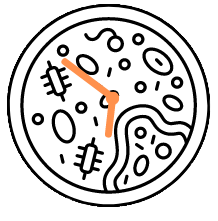The Brooks lab will explore how the circadian clock interfaces with the immune system to maintain harmony with the gut microbiome. The intestinal barrier functions as the first line of defense, keeping gut microbes from escaping into the bloodstream and infecting tissues throughout the body. To maintain this barrier, front-line cells secrete a variety of antimicrobial proteins (AMPs) that kill or inhibit the growth of bacterial interlopers. My lab has discovered that key AMPs made in the small intestine display a daily rhythm dependent on the circadian clock. However, we found that, during persistent gut infection, these AMPs are produced continuously. Currently, the mechanisms that underlie crosstalk between the circadian clock and the immune system are ill-defined. Now, using methods in cell and molecular immunology, mouse genetics, and genomics, my lab will examine how persistent infection overrides the circadian clock’s directives and stimulates the continuous secretion of AMPs to help eradicate the infection. This work could lead to novel therapies for disorders associated with the disruption of circadian rhythms, including obesity, diabetes, and chronic gut inflammation as well as vulnerability to food-borne pathogens such as Salmonella or E.coli.

